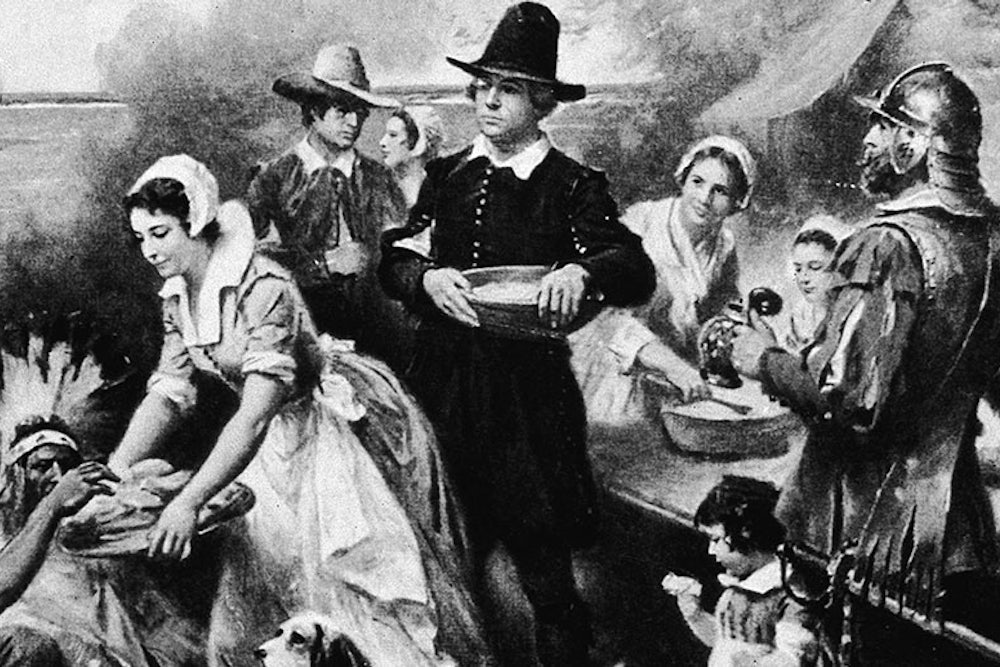Happy Thanksgiving. That is not a political sentiment. Yet this year, everything seems partisan and even this most unifying of national holidays has become an occasion for ideological warfare.
The idea now popular in conservative circles is that all past interpretations of Thanksgiving are tainted either by malign forms of multiculturalism—did those white colonists really need help from the Indians to get their act together?—or by dangerous inclinations to socialism.
Some of our friends on the ascending right wing insist that it's a big lie to use Thanksgiving to celebrate how the Pilgrims pulled together and, with the help of God, prospered through communal assistance and a little help from their new neighbors. They buy the part about the Almighty but insist this holiday is primarily about the virtues of American capitalism and how free enterprise saved those folks at Plymouth.
The historian Rush Limbaugh has been pushing this view since 1993 when he published the definitive account in his book See, I Told You So. Year after year, he's used his talk show to teach us that the settlers suffered because at the outset, their land and their homes "belonged to the community." As Limbaugh exclaimed on a 2007 show, "They were collectivists!"
The colony's governor, William Bradford, saw that this destructive nonsense was failing, Limbaugh instructs us, took "bold action" and "assigned a plot of land to each family to work and manage, thus turning loose the power of the marketplace." The moral of the story: "Long before Karl Marx was even born, the Pilgrims had discovered and experimented with what could only be described as socialism. And what happened? It didn't work!"
Now it's a fact that the mainstream media and liberal columnists have largely ignored this bold reinterpretation of American history—or perhaps we were covering it up, fearing that Limbaugh's blinding insight would take hold and foil our collectivist designs.
But the rise of the Tea Party movement has forced everyone to pay attention to such dissident notions, and thus did The New York Times' Kate Zernike helpfully chronicle the Thanksgiving thinking of the Limbaugh School and the much earlier right-wing accounts on which it is based. She also pointed out that the actual story of the Pilgrims was, well, a bit more complicated than Limbaugh and his philosophical forebears would like it to be. This led him to sniff on his Tuesday broadcast that Zernike's point was that "hey, socialism wasn't that bad for the Pilgrims." That's not what she said, but never mind.
Now I want to be honest: Given what I do for a living and my own inclinations, I'm perfectly capable of politicizing all manner of issues, too. It's also true that national holidays almost necessarily invite this sort of debate. We are, after all, celebrating something, and it shouldn't surprise us that we'd tangle over exactly what that something is. Besides, having grown up in a politically diverse extended family, I have fond memories of Thanksgiving dinners being the staging ground for many a raucous debate. Why not argue about the holiday itself?
Yet putting aside the dangers of allowing ideology to distort the facts of our present and our past, we seem to have lost our sense of balance as a country. This argument over Thanksgiving strikes me as a symptom of our failure to acknowledge that the American story is not all one thing or all another.
It is, instead, a tale of a healthy and ongoing tension between our love of individualism and our reverence for community. Capitalism is part of our story, but so is solidarity and the idea that no one ever really "goes it alone." Our rights are embedded in a web of social bonds and obligations that enrich us. We have a responsibility to take care of ourselves and our families, but also to look out for one another. And we hope that if we run into trouble, someone, maybe even the entire community, will look out for us.
Such homely sentiments, edited down a bit, could be stitched on a holiday sampler. These are the values not of an angry and radical individualism but of a tempered individualism that is truer to the Pilgrims' faith and our national experience. I'll grant the Tea Party historians the virtues of those industrious farmers if they'll grant me that these early.
Americans believed passionately in a common good and the promise of mutual assistance. Then we can sit down together, enjoy our turkey or leftovers, and argue about everything else.
